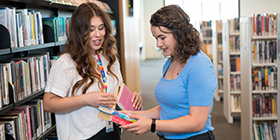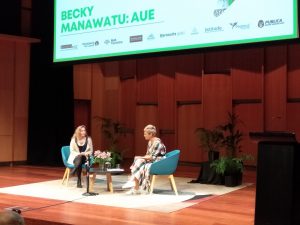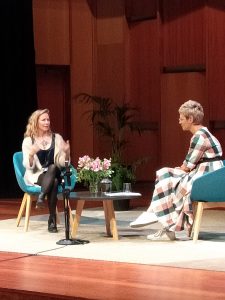I came across Auē for the first time when a customer asked me if the Library had it. We did. And it had about 50 holds. What was it about this new book that seemed to attract so many people? Since then I have heard that the book is “really good” and people are making comparisons with Once Were Warriors by Alan Duff, a Kiwi classic with a film adaptation. However, this particular comparison made me a bit apprehensive about reading 'Auē' since it is well known that Duff’s title is brutal and violent, and violence in books (or anywhere for the matter) is not my cup of tea.
Nevertheless, this book kept appearing in recommendations lists, kept winning awards, and people are still talking about it, so I decided to go to the WORD Christchurch Spring Festival to listen to Becky Manawatu talk and hear from the author herself, why should I read this book?
However, things do not always work as we expect them to, and as it turns out the interview centred on her and her journey to writing her first book.
The interviewer was Emma Espiner, who is a New Zealand writer and political commentator and, as of today, finished her Medical studies at the University of Auckland. Very exciting. She had a very amiable manner and was a great choice for moderator. She helped the introverted Becky many times when she was a bit lost for words since Becky finds it harder to speak than to write:
“I like writing because writing moves with the pace of my thoughts.”
Then she spoke about what moved her to write Auē:
“I had some mamae [ache, pain, injury, wound] in me. I also wanted to connect with people I had lost connection with.“
She had read a blog about writing as a form of therapy and she feels she used this book in that way. At different points in her writing process she felt that she was telling different people about her pain.
She also told us that “Auē is a beautiful part of my life, but I have moved on and I am now working on my next book”. Quoting Witi Ihimaera she said she feels she has to write the next book to continue the conversation, to fix what she could have done better. It will be a loose sequel to Auē “because I miss some of the characters” and she wants to go back and explore one or two characters more deeply. Also she feels that perhaps she “came a bit hard” on her first novel so in the next one she will try to “bring back some balance.”
When she confessed that the criticism of her novel as being unnecessarily violent had made her feel sad, Emma was prompt to assure her that she was exceptional and was being too hard on herself, which I thought was very nice from the host. I felt that during the whole interview Becky took every question seriously answering as honestly as she could. On one occasion she said genuinely “I don’t know what to say”, which was interesting to hear from someone that has written a 300 page novel.
Then Becky narrated how she started her novel in Germany where she had felt a desire to tell the story because “I felt isolated and missed Aotearoa, and my family” and she had not many distractions. All these circumstances drove her to give writing a go.
Emma: Was [your book] good straight away?
Becky: No. I felt it was good then. A writer thinks they have done something really special to them. The bones were good.
But reading the first version once the book had been published made her realise what a better work it was thanks to the editing. She also talked about her good relationship with her publisher Mary, who was in the audience, and how this perhaps contributed to her book becoming popular, as well as the fact that Auē is a Māori novel in Te Ao Pākehā which probably has made it more accessible to Pākehā readers. Emma then compares her to a gateway drug (to Māori writing). Cool.
She explained how the process of writing and publishing her story took a lot of time and effort:
“there is a little bit of magic [in writing] but mostly hard work. You sit down when you can and then start writing, You write first and then you move. It takes discipline and it takes a little while to write [something that is not crap]”.
In 2018 Becky went through a phase of reading only New Zealand writers and one of the most memorable books she read was Sarah Vaughan is not my mother by Mary Jane Thompson. But she also read books by Witi Ihimaera and Eleanor Catton’s The Luminaries, of course. During this period Becky did not come across many Māori stories, “there is a lot of talent in the New Zealand literary scene, but just not enough Māori stories. I wish there were easier pathways for Māori writers” she adds.
She also mentioned how she has always identified herself as Māori, even though her identity has been questioned many times while growing up. She tells the story of her new moko showing proudly on her chest. She said it was created and designed by Rosie Edwards, who drew a moko kauae in the design and this moved her to tears, because Rosie added: “this is so that you know you are enough and don’t think you are not.”
She has now finished writing for The News and has won a scholarship to study at the University of Otago where she plans to learn te reo Māori, and write her next story. Emma then finished the interview: “Thank you for being your authentic self”.
So, why should you read this book? I am afraid I still have no concrete nor compelling answer, but I will let you know that after the talk I felt somehow inspired to buy her book and get it signed by her. So who knows, maybe one day I will read it.
WORD Christchurch
- Visit the WORD Christchurch website for the full programme of events
- View our page on WORD Christchurch Spring Festival 2020 for reports, articles, and interviews
- Folllow WORD Christchurch on:






Add a comment to: WORD Christchurch 2020: Becky Manawatu – Auē